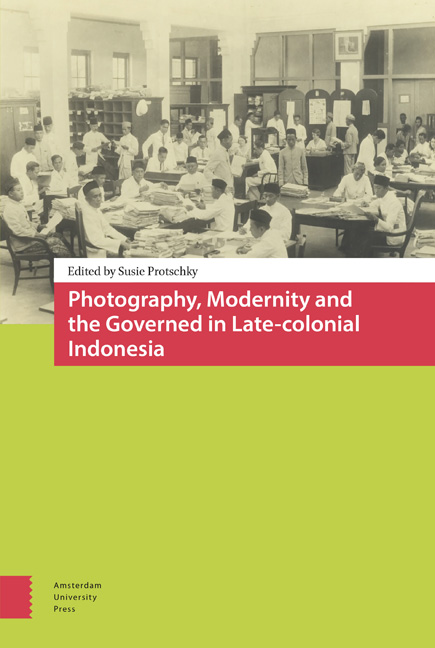Book contents
- Frontmatter
- Contents
- Acknowledgments
- Part I Governing Lenses on Ethical Policy and Practice
- 1 Camera Ethica: Photography, modernity and the governed in late-colonial Indonesia
- 2 Ethical policies in moving pictures: The films of J.C. Lamster
- 3 Ethical projects, ethnographic orders and colonial notions of modernity in Dutch Borneo: G.L. Tichelman's Queen's Birthday photographs from the late 1920s
- 4 Saving the children?: The Ethical Policy and photographs of colonial atrocity during the Aceh War
- Part II Local Lenses on Living in an “Ethical” Indies
- 5 Interracial unions and the Ethical Policy: The representation of the everyday in Indo-European family photo albums
- 6 Reversing the lens: Kartini's image of a modernised Java
- 7 Modelling modernity: Ethnic Chinese photography in the ethical era
- 8 Modernity and middle classes in the Netherlands Indies: Cultivating cultural citizenship
- 9 Say “cheese”: Images of captivity in Boven Digoel (1927-43)
9 - Say “cheese”: Images of captivity in Boven Digoel (1927-43)
Published online by Cambridge University Press: 11 December 2020
- Frontmatter
- Contents
- Acknowledgments
- Part I Governing Lenses on Ethical Policy and Practice
- 1 Camera Ethica: Photography, modernity and the governed in late-colonial Indonesia
- 2 Ethical policies in moving pictures: The films of J.C. Lamster
- 3 Ethical projects, ethnographic orders and colonial notions of modernity in Dutch Borneo: G.L. Tichelman's Queen's Birthday photographs from the late 1920s
- 4 Saving the children?: The Ethical Policy and photographs of colonial atrocity during the Aceh War
- Part II Local Lenses on Living in an “Ethical” Indies
- 5 Interracial unions and the Ethical Policy: The representation of the everyday in Indo-European family photo albums
- 6 Reversing the lens: Kartini's image of a modernised Java
- 7 Modelling modernity: Ethnic Chinese photography in the ethical era
- 8 Modernity and middle classes in the Netherlands Indies: Cultivating cultural citizenship
- 9 Say “cheese”: Images of captivity in Boven Digoel (1927-43)
Summary
Introduction
Several prominent scholar-officials of the Netherlands Indies – the best known among them, B.J.O. Schrieke (1890-1945) – had been instrumental in the discussions about, process of creating and implementation of the overall principles of Boven Digoel, the prison camp for political dissidents that was established by the colonial regime in New Guinea. J.A.C. Dirk de Graeff (1872-1957, r. 1927-31), the last Governor-General connected with the Ethical Policy, oversaw Boven Digoel's beginnings. Two persons arguably most representative of the late “ethical” approach to governing the Indies, H.J. van Mook (1894-1965, r. 1942-48) and Charles O. van der Plas (1891-1977), authored probably the most often quoted comments about Boven Digoel, referring to it as a sort of ordinary Javanese village. There is no irony in this. Boven Digoel is a particularly impressive portrait of the calculated, Calvinist, blasé and soft nature of ethical Dutch rule in the Indies – say “cheese”.
At the end of 1926 and in early 1927, out of desperation more than anything else, the Communists in the Netherlands Indies attempted a revolution. The Dutch colonial administration crushed the rebellion mercilessly and punished all those caught in action. Some – a few hundred at first, but ultimately close to five thousand – of whom no direct action could be proven, only sympathy or intentions, were sent to a new, hastily built camp in New Guinea, the easternmost part of the colony. Legally married couples and their families could join the exiles if they so wished. These were not criminals – this was officially stated – and thus there needed to be no trials, and no time limit was set to the internment.
The purpose of the camp was to isolate a possible evil of disorder and extremism from well-behaved colonial society. The camp had been built at the edge of the empire and deep into the frontier island, up on the big Digoel River, still at that time three days by steamer from the sea – thus the name of the camp was Boven (Upper) Digoel. The camp was in the middle of the endless forests inhabited by the Papua people, famed (happily emphasised by the guards and administrators of the camp) for being the most primitive, the wildest people on the earth, and cannibals.
- Type
- Chapter
- Information
- Publisher: Amsterdam University PressPrint publication year: 2015

